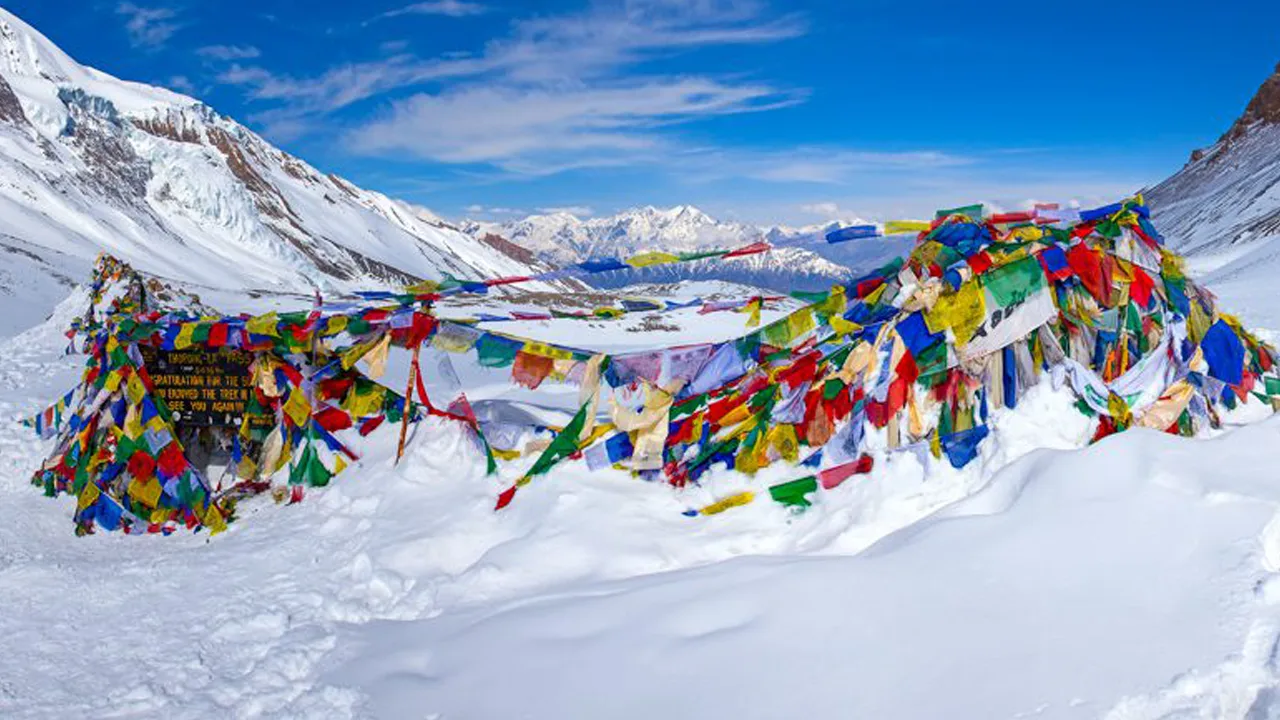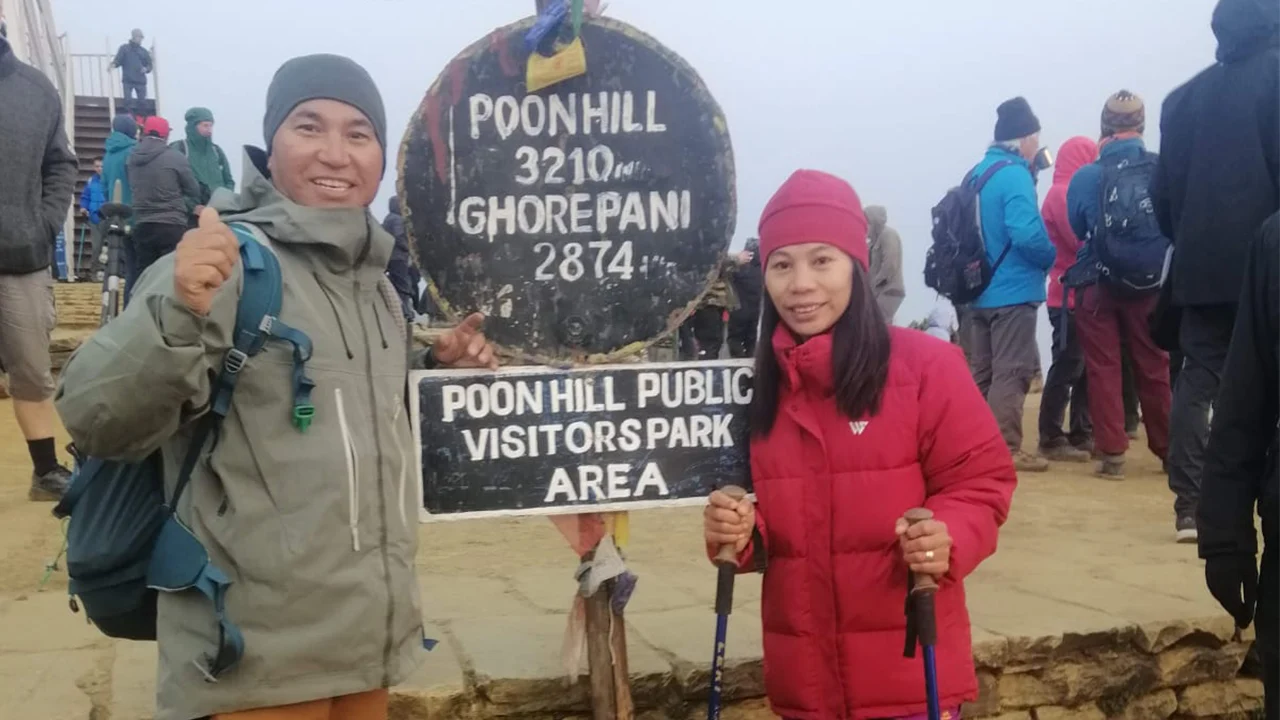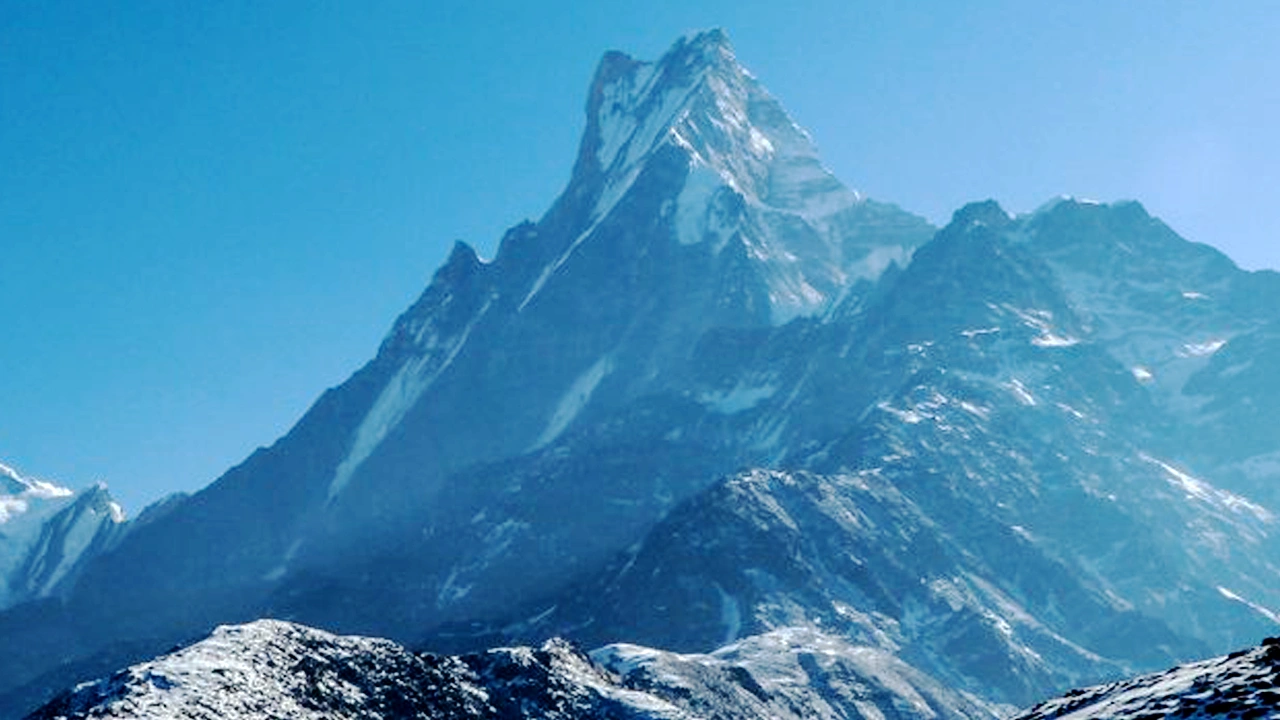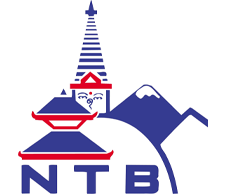Upon your arrival at Tribhuvan International Airport, a staff member will warmly welcome you and escort you to your hotel. Kathmandu is a lively city where ancient temples meet bustling bazaars. The rest of the day is free to rest, adjust to the altitude, or explore the vibrant streets of Thamel. Dinner options range from traditional Nepali dal bhat to international cuisine. Overnight in a hotel.
Annapurna Base Camp Trek – 17 Days
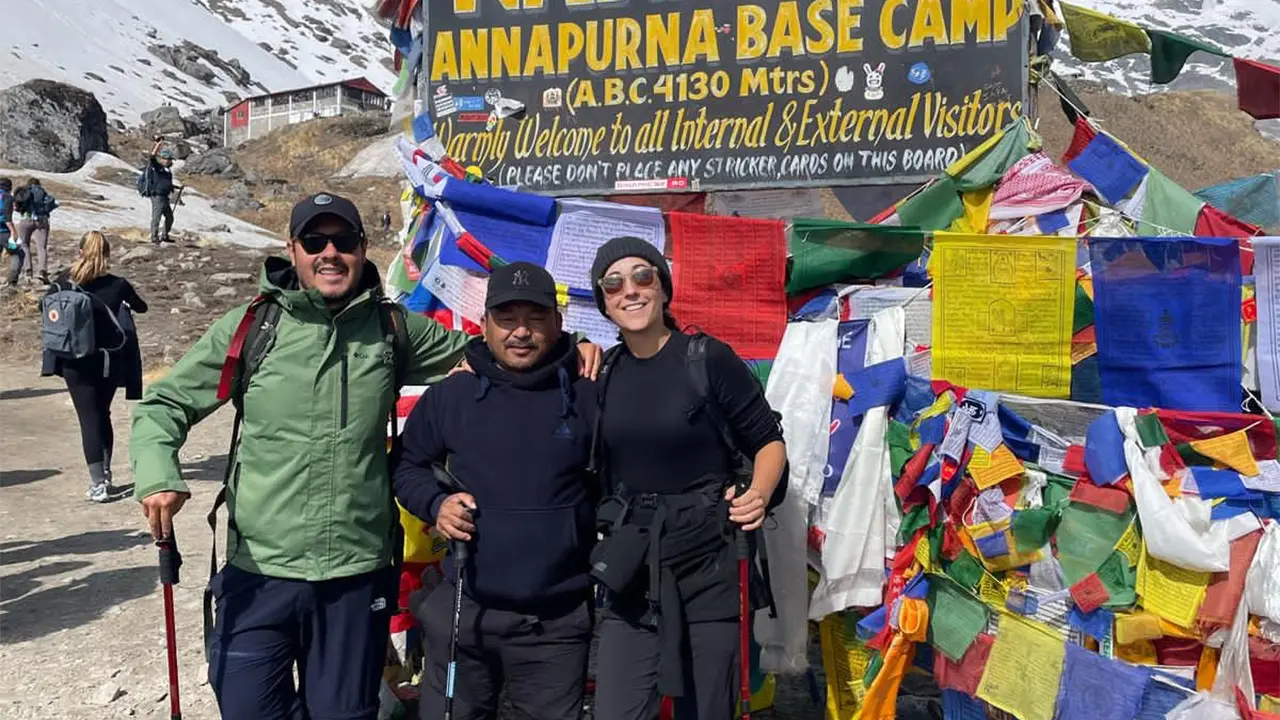
Overview
The Annapurna Circuit Trek – 17 Days is one of Nepal’s most iconic trekking adventures, offering diverse landscapes, rich cultural experiences, and panoramic Himalayan views. This trek takes you through lush subtropical forests, terraced farmland, high-altitude deserts, and traditional villages, allowing travelers to witness the full spectrum of the Annapurna region.
The trek begins with a drive from Pokhara to Besisahar, where the trail starts its gradual ascent through small villages, terraced fields, and riverside paths. Along the way, trekkers pass through ethnic Gurung and Magar villages, offering a glimpse into local traditions, architecture, and lifestyle. The combination of cultural encounters and natural scenery makes this trek unique and enriching.
One of the key highlights of the Annapurna Circuit is crossing the Thorong La Pass at 5,416 meters, the highest point of the trek. From the pass, trekkers are rewarded with breathtaking views of Annapurna, Dhaulagiri, and Machapuchhre, creating an unforgettable Himalayan experience. The route also includes Muktinath Temple, a sacred site for both Hindus and Buddhists, adding a spiritual dimension to the journey.
The trek features accommodation in tea houses and lodges, providing warm meals and comfortable resting points. Daily trekking distances are moderate to challenging, with gradual elevation gain to allow acclimatization. Experienced guides and optional porters are available to enhance safety and convenience, making the trek accessible for adventurous travelers with good fitness levels.
Throughout the 17 days, trekkers experience changing landscapes from green valleys to high-altitude deserts, rivers, and rhododendron forests. The Annapurna Circuit offers less crowded trails compared to other Himalayan routes, allowing trekkers to enjoy the serenity of the mountains and local culture.
By the end of the trek, travelers return to Besisahar or Pokhara, carrying memories of majestic peaks, diverse terrain, and cultural richness. The Annapurna Base Camp Trek – 17 Days is ideal for those seeking a comprehensive Nepal trekking experience, combining adventure, culture, and Himalayan exploration in a single journey.
A guided city tour introduces you to Kathmandu’s cultural and spiritual highlights. You may visit Pashupatinath Temple (Hindu pilgrimage site), Boudhanath Stupa (Buddhist monument), and Swayambhunath (Monkey Temple). Each site reveals Nepal’s rich traditions and spirituality. In the afternoon, your trekking guide will brief you on the ABC trek and help with gear checks. Overnight at your hotel with a hearty dinner.
Today you take a scenic drive to Pokhara, the gateway to the Annapurnas. The road winds along the Trishuli River, passing terraced fields, villages, and green hills. Pokhara is a lakeside city with stunning views of Machapuchare (Fishtail Peak) and Annapurna South. You can stroll around Phewa Lake, relax at cafés, or prepare for the trek. Overnight at a lakeside hotel.
After breakfast, a jeep ride takes you to Nayapul, where the trek begins. Walking uphill through terraced fields and traditional Gurung villages, you’ll arrive in Ghandruk, a charming settlement with stone-paved alleys. The village is famous for its Gurung Museum and panoramic views of Annapurna South, Hiunchuli, and Machapuchare. Overnight in a local tea house with mountain views.
The trail ascends gradually before descending to the Kimrong Khola. From here, a steep uphill climb leads to Chhomrong, the gateway to the Annapurna Sanctuary. The village offers breathtaking views of Annapurna South and Machapuchare. Chhomrong has good tea houses where trekkers can rest, enjoy fresh meals, and prepare for higher altitudes.
The trail descends stone steps to the Chhomrong Khola and then climbs steeply through forests of bamboo, rhododendron, and oak. You’ll pass through villages like Sinuwa and Bamboo before reaching the Himalaya Hotel area. The valley narrows here, and the scenery becomes wilder, with waterfalls cascading down cliffs. Overnight in a tea house.
Today is the most spectacular day of the trek. The trail passes through Deurali and gradually ascends to Machapuchare Base Camp (3,700m). From here, you continue into the Annapurna Sanctuary, a dramatic glacial basin surrounded by towering peaks. Reaching Annapurna Base Camp, you are greeted with stunning views of Annapurna I, Annapurna South, Hiunchuli, and Machapuchare. Overnight at ABC tea houses, surrounded by snowy giants.
After a sunrise view over Annapurna I, you begin your descent. Retracing your steps through Machapuchare Base Camp, Deurali, and Bamboo, the long downhill brings you to Sinuwa. The descent is steep at times, requiring careful footing. Overnight in a tea house where warm food and lower altitude provide comfort.
A short trek brings you to Jhinu Danda, famous for its natural hot springs by the Modi Khola river. After relaxing, continue trekking to Landruk, a picturesque Gurung village set on terraced hillsides. The views of Annapurna South and Hiunchuli are breathtaking. Overnight at a lodge in Landruk.
The final trekking day descends gradually to Phedi. From here, a short drive brings you back to Pokhara. The lakeside city feels like a paradise after the trek, offering good food, hot showers, and stunning reflections of the Himalayas in Phewa Lake. Overnight at a hotel by the lakeside.
A scenic drive retraces your route to Kathmandu. Along the way, enjoy riverside views and glimpses of rural life. The evening in Kathmandu is free for last-minute shopping or simply relaxing in your hotel.
After breakfast, you’ll be transferred to Tribhuvan International Airport for your international flight. Your Annapurna Base Camp trek concludes with lasting memories of Himalayan landscapes, Gurung culture, and alpine adventure.
Trek from Doban to Jhinu Danda
Trek from Jhinu Danda to Pothana
Trek from Pothana to Dhampus Phedi and Drive to Pokhara
Drive/Flight from Pokhara to Kathmandu
Farewell Departure
Cost Includes
- Professional trekking guide and support staff for safety and smooth trekking.
- Accommodation in tea houses/lodges along the trail.
- Daily breakfast, lunch, and dinner during the trek.
- All necessary trekking permits, including Annapurna Conservation Area Permit (ACAP) and TIMS card.
- Airport transfers in Kathmandu (arrival and departure).
- Transportation to and from the trailhead.
- Optional porters to carry luggage for a more comfortable trekking experience.
- Emergency support and first aid kit available throughout the trek.
- Pre-trek briefing in Kathmandu covering the route, safety, and cultural insights.
Cost Excludes
- International airfare to and from Nepal.
- Nepal visa fees for entry.
- Travel insurance (mandatory for trekking, including high-altitude medical evacuation).
- Personal expenses such as snacks, drinks, souvenirs, and hot showers.
- Trekking gear and equipment like sleeping bags, trekking boots, jackets, and walking sticks.
- Tips for guides and porters.
- Optional activities or side trips not mentioned in the itinerary.
FAQs
The trek is considered moderate to challenging, suitable for travelers with good fitness. Daily trekking ranges from 4–7 hours, with gradual ascents to help with acclimatization. The highest point is Annapurna Base Camp at 4,130 meters, making it manageable for trekkers prepared for high-altitude hiking.
The ideal trekking seasons are spring (March to May) and autumn (September to November). Spring offers rhododendron blooms and lush landscapes, while autumn provides clear skies and excellent mountain views. Monsoon season (June–August) brings rain and slippery trails, and winter can be very cold with snow on higher routes.
The trek usually starts from Syauli Bazaar or Nayapul, accessible via a 5–7 hour drive from Pokhara. The route passes through rivers, terraced fields, and local villages, giving trekkers a glimpse of rural Nepalese life before the trail gradually ascends toward the Annapurna region.
Accommodation is provided in tea houses and lodges, which are simple but comfortable. Rooms are often shared, with basic bedding, and there are common areas for relaxation. Meals include breakfast, lunch, and dinner, featuring traditional Nepali dishes like dal bhat, noodles, soups, and momos.
While independent trekking is possible, hiring a professional guide is highly recommended. Guides provide navigation, safety, cultural insights, and manage permits. Optional porters are available to carry luggage for a more comfortable trekking experience.
The main permits required are:
-
Annapurna Conservation Area Permit (ACAP) – grants access to the protected region.
-
TIMS Card (Trekkers’ Information Management System) – mandatory for all trekkers in Nepal.
Most trekking packages include these permits, and guides assist with the application process.
Essential items include:
- Layered clothing for warm days and cold mornings/nights
- Trekking boots and gaiters for rocky trails
- Sleeping bag rated for -5°C to -10°C
- Walking poles for stability
- Sunglasses, sunscreen, and hat
- Water bottles or hydration system
- Basic first aid kit and personal medications
Yes, the Annapurna Base Camp Trek is suitable for fit families and older trekkers with prior trekking experience. Daily trekking distances are moderate, and there are villages along the trail for rest and meals. Hiring a guide is recommended for safety, especially at higher altitudes near Annapurna Base Camp.
Key highlights include:
- Views of Annapurna South, Machapuchhre, and Hiunchuli
- Annapurna Base Camp at 4,130 meters
- Traditional Gurung and Magar villages
- Rhododendron forests, terraced fields, and alpine meadows
- Peaceful trails away from crowded routes
The trek reaches 4,130 meters at Annapurna Base Camp, so proper acclimatization is essential. Trekkers should walk slowly, hydrate, and follow guide instructions. Guides are trained to recognize altitude sickness symptoms and can recommend rest or slower trekking if necessary.
Annapurna Base Camp Trek – 17 Days
Trekking & Hiking Adventure

